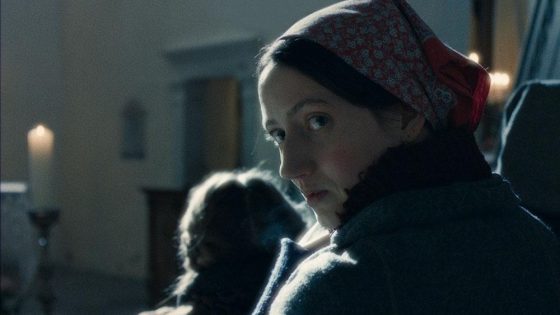With head bowed, over clasped hands, Italian director Maura Delpero‘s quietly breathtaking “Vermiglio” unfolds from tiny tactile details of furnishings and fabrics and the hide of a dairy cow, into a momentous vision of everyday rural existence in the high Italian Alps. Far away, the Second World War is ending — an earthshaking event felt here only in abstract ways, because there’s the real labor of community and family to be getting on with, to say nothing of the private work of finding your own path to tread beneath those towering peaks. To those who live on their slopes, the mountains must be the beginning and end of everything, the amen on every prayer.
It is winter and a sleeping household, with two or three to a bed, gradually stirs. The eldest daughter Lucia (Martina Scrinzi) milks the cow, dreamily resting her face, which she has apparently stolen from a Vermeer painting, against the animal’s warm flank. Her mother Adele (Roberta Rovelli) will heat the milk and dole it out among her seven children, along with hunks of dipping-bread for breakfast. Automatically, the jostling kids (mostly non-professionals delivering effortless naturalism) arrange themselves in order of size at the stout table around which so much of this family’s life is centered. And at its head, always, sits Adele’s husband Caesar (Tommaso Ragno), a stern but not unloving patriarch with the sonorous voice of a man used to being obeyed, who runs the local one-room school where all of his kids, bar his youngest, sickly infant, are taught the same lessons regardless of age.
Over the course of the changing seasons, the gaze of Mikhail Krichman’s magnificently austere, self-possessed camera is divided among the many family members, catching each of them at work or rest as the carbolic-scrubbed harshness of their daily domestic routines is offset by community gatherings and bursts of play and those times when Caesar brings his beloved gramophone into the classroom and teaches his students to hear the summer in Vivaldi’s music. But while other relationships are outlined — eldest son Dino (Patrick Gardner) is surly and resentful toward his father; flirtatious neighbor Virginia (Carlotta Gamba) causes a flutter of sexual confusion — focus is pulled gradually onto Caesar’s daughters. There’s Flavia (Anna Thaler), the smart one who is destined to win the only chance for a proper education that the family can afford. There’s Ada (Rachele Potrich) the strange, dark one with her notebook full of self-devised atonements for the sinful times she sneaks behind the wardrobe door to touch herself. And there’s pretty Lucia falling for Pietro (Giuseppe De Domenico), a soulful-eyed soldier from Sicily who saved her uncle’s life and then deserted with him to hide out in the village.
Lucia and Pietro’s romance is told in glances and fumbles and the illiterate love notes that the young man, who speaks a different dialect, delivers through the bedroom window. Meanwhile the old, non-military-age men who gather in the village argue over the wisdom of hiding the outsider. “Deserters are nothing but cowards!” declaims one tipsy blowhard. “If only they were all cowards, there wouldn’t be any war,” observes Caesar mildly. Soon, there’ll be a wedding and another pregnancy and though life in these parts is hard and a certain amount of tragedy is expected, the calamity, when it comes, will be, like all calamities, unforeseen.
The editing by Luca Mattei is evocative through economy: simply by cutting from Adele superstitiously wrapping her ailing infant son in cabbage leaves, to a shot of the falling snow, we understand — even before we see Adele, already pregnant again, grieving at a little cross — that in the interim, the child has died. But then, economy is the watchword of this deceptively formalist film: every aspect of the filmmaking, from Krichman’s immaculate compositions, to the worn, neat costuming from Andrea Cavalletto to the simplicity of Matteo Franceschini’s spartan piano-based score, speaks to the restraint that Delpero exercises in playing on our feelings. Not because she herself does not feel, but because, like her stoic characters, she is holding herself in check with an almost brutal degree of self-discipline. It contributes to a fascinating narrative remove, which is belied by the close-up clarity of the imagery, but then, up here in the clean alpine air, no matter how distant your vantage point, you can see forever.
None of us has to go very far back in our family history before stumbling on a gap in the generational, hand-me-down memories that no living relative can fill. The remarkable, raw-boned and ravishing “Vermiglio” takes place in the past but operates like a future family secret playing out in the present tense, a perspective that is not quite Godlike, but comes from that which we might as well call God — the spirit of the mothers and the sisters and the daughters who came before and after, and who trusted the imperious mountains to keep their secrets.
Source Agencies



